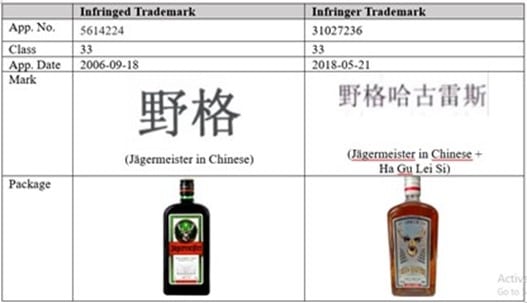The importance of getting characters filed in China
As enterprises extend their footprint into the expansive market of China and beyond, the importance of trade marks comes into focus. International trade marks serve two commercial roles. First, owning trade marks internationally are a crucial defence mechanism against counterfeit products and copycats, ensuring the protection of corporate logos, symbols, characters and designs from unauthorised usage. Second, trade marks ensure that goods exported out of China arrive at your designated market(s) without issues at border control (customs).
Below we explore a recent trade mark battle between liquor brands Jägermeister and Yego Hunter regarding Chinese characters. This case demonstrates how trade marks can protect your brand internationally. We then discuss how owning the trade mark in China in both its English expression and in Chinese characters can avoid a supply chain disaster.
Trade mark Triumph in China: Jägermeister wins against Yego Hunter in Beijing Court
Background
In a recent judgment, Jägermeister, the iconic German digestif, scored a major win against Yego Hunter, a liqueur produced by a conglomerate of companies and an individual named Chang.
Jägermeister is well known for its unmistakable green bottle adorned with a deer head logo. In this case, Yego Hunter was accused of using logos and graphics reminiscent of the trade marks on Jägermeister’s bottle and website. It was a classic case of trade mark infringement and unfair competition.
Were Jägermeister’s trade marks validly registered?
Jägermeister claimed ownership of well-known trade marks like “野格” and “JÄGERMEISTER”. Backed by a cease-and-desist letter that was overlooked by Yego Hunter, the court was called upon to settle the dispute.
The defendants argued they had the right to use their registered trade mark “野格哈古雷斯,” but the Beijing IP Court dropped the gavel in Jägermeister’s favour. The court highlighted striking visual and structural similarities between the trade marks, even diving into the 3D appearance of the bottles, sending a strong message about the severity of trade mark infringement.
No.5614224: “野格”
No.992806: “JÄGERMEISTER”
No.G795174:
No.G287599:
No.G1291858:
The ruling wasn’t just a victory for Jägermeister; it also came with a 10 million RMB compensation (approximately AUD$2,153,801.12), including punitive damages. The court based this hefty sum on Yego Hunter’s monthly sales, which blew past the required compensation.
What does this judgment mean?
This trade mark battle highlights the significance of recognising and protecting well-known trade marks. The court’s decision reinforces the need for businesses to respect intellectual property rights, avoid infringement and adhere to fair competition practices.
Avoiding customs hold ups and supply chain meltdowns by owning your trade mark
Ensuring you register your trade mark in China is essential for companies with manufacturing in China.
A widely known Australian retail brand with global retail stores experienced the consequences of failing to do this.
The brand did not have a registration for their Australian trade mark in China. A pirate registered the trade mark and took their registration certificate to the Chinese customs authorities to block all exports out of China, holding up supply to retail stores globally. The pirate then escaped to Eastern Europe and held the Australian brand to ransom.
The Australian brand had to spend an exorbitant amount on legal costs for lawyers in China and Eastern Europe to find the pirate and negotiate a transfer of the Chinese-registered trade mark back to the Australian brand.
This all could have been avoided if the Australian brand owned the trade mark in China from the start.
How can MK assist you?
If you’re unsure whether your brand’s IP is sufficiently protected, get in touch with MK’s award winning Intellectual Property team.
The information contained in this article is general in nature and cannot be relied on as legal advice nor does it create an engagement. Please contact one of our lawyers listed above for advice about your specific situation.
stay up to date with our news & insights
The importance of getting characters filed in China
As enterprises extend their footprint into the expansive market of China and beyond, the importance of trade marks comes into focus. International trade marks serve two commercial roles. First, owning trade marks internationally are a crucial defence mechanism against counterfeit products and copycats, ensuring the protection of corporate logos, symbols, characters and designs from unauthorised usage. Second, trade marks ensure that goods exported out of China arrive at your designated market(s) without issues at border control (customs).
Below we explore a recent trade mark battle between liquor brands Jägermeister and Yego Hunter regarding Chinese characters. This case demonstrates how trade marks can protect your brand internationally. We then discuss how owning the trade mark in China in both its English expression and in Chinese characters can avoid a supply chain disaster.
Trade mark Triumph in China: Jägermeister wins against Yego Hunter in Beijing Court
Background
In a recent judgment, Jägermeister, the iconic German digestif, scored a major win against Yego Hunter, a liqueur produced by a conglomerate of companies and an individual named Chang.
Jägermeister is well known for its unmistakable green bottle adorned with a deer head logo. In this case, Yego Hunter was accused of using logos and graphics reminiscent of the trade marks on Jägermeister’s bottle and website. It was a classic case of trade mark infringement and unfair competition.
Were Jägermeister’s trade marks validly registered?
Jägermeister claimed ownership of well-known trade marks like “野格” and “JÄGERMEISTER”. Backed by a cease-and-desist letter that was overlooked by Yego Hunter, the court was called upon to settle the dispute.
The defendants argued they had the right to use their registered trade mark “野格哈古雷斯,” but the Beijing IP Court dropped the gavel in Jägermeister’s favour. The court highlighted striking visual and structural similarities between the trade marks, even diving into the 3D appearance of the bottles, sending a strong message about the severity of trade mark infringement.
No.5614224: “野格”
No.992806: “JÄGERMEISTER”
No.G795174:
No.G287599:
No.G1291858:
The ruling wasn’t just a victory for Jägermeister; it also came with a 10 million RMB compensation (approximately AUD$2,153,801.12), including punitive damages. The court based this hefty sum on Yego Hunter’s monthly sales, which blew past the required compensation.
What does this judgment mean?
This trade mark battle highlights the significance of recognising and protecting well-known trade marks. The court’s decision reinforces the need for businesses to respect intellectual property rights, avoid infringement and adhere to fair competition practices.
Avoiding customs hold ups and supply chain meltdowns by owning your trade mark
Ensuring you register your trade mark in China is essential for companies with manufacturing in China.
A widely known Australian retail brand with global retail stores experienced the consequences of failing to do this.
The brand did not have a registration for their Australian trade mark in China. A pirate registered the trade mark and took their registration certificate to the Chinese customs authorities to block all exports out of China, holding up supply to retail stores globally. The pirate then escaped to Eastern Europe and held the Australian brand to ransom.
The Australian brand had to spend an exorbitant amount on legal costs for lawyers in China and Eastern Europe to find the pirate and negotiate a transfer of the Chinese-registered trade mark back to the Australian brand.
This all could have been avoided if the Australian brand owned the trade mark in China from the start.
How can MK assist you?
If you’re unsure whether your brand’s IP is sufficiently protected, get in touch with MK’s award winning Intellectual Property team.











